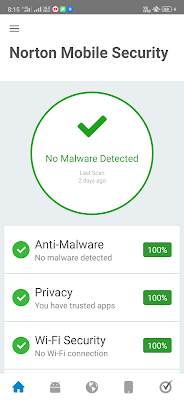5 tips for protecting your android phone
 |
| Android security |
About 99% of cyber attacks in the first quarter of 2015 were sent to Android devices. The most frequent attacks were aimed at sending expensive SMS messages to short numbers, stealing user data and tracking the location of the device. On the example of Android, it is clearly seen that the more popular a product is, the more it is subject to attacks by intruders. What opportunities are opened for violators if you are a user of the gadget running the Android OS?
Features of Android, which were considered benefits, turned into a surge of vulnerabilities and threats to users and their data! For example, all Android OS applications, as well as the user himself, work with limited rights. To expand the user's capabilities, there is an operation to obtain superuser rights (by the way, a similar operation in iOS is called jailbreak ). With this operation, it is possible to install fraudulent software without user permission! In total, in the first three months of 2015, security experts discovered 275 new malware options for attacking Android devices. Even the official app store has become a “hotbed of malware”. What can we say about the torrent trackers, where all the applications are located, with advanced functionality, for which the store has to pay?
Criminals can modify the program code in such a way that malware will be installed along with the software, which will steal your money and valuable information! At the official Google Play store at least there are user comments from which you can find out that the application contains malicious code. Consider another cybercriminals technique. Recently, cybercriminals have organized an SMS spam distribution to spread the Android Trojan. In the SMS, it was reported about the response to the ad, and there was also a link. After clicking on the link, users are taken to a fraudulent site from which the Trojan is being downloaded. The Trojan sends the intruders data about the infected device, after which it can intercept incoming SMS, send SMS to short numbers,
Mobile gadgets satisfy all modern needs: photos, videos, social networks, games, business applications, constant Internet access, access to the corporate network and many others. But as if the device was not used - it must be protected! And to protect the device will help the following rules:
Rule 1. Be alert and do not follow links in emails or SMS. Even if the link suddenly sent a familiar contact, it is always better to ask again.
Rule 2. Some viruses are extremely difficult to detect. Avoid installing applications from questionable sources (for example, torrents). In the official Google Play store, always read the comments about the application - they often report that there is malicious code in the software. Avoid applications from lesser-known creators and with low marks. In Google Play, the mark “best developer” will help to distinguish genuine programs from fake ones. In the system settings (in the “Security” add-in ), you need to remove the “Unknown sources” permission and set the “Check applications” permission.
Rule 3.
 |
| WiFi security |
Do not connect to unknown Wi-Fi networks. Some hackers create free access points to the Internet and intercept traffic from users who simply decide to check their email. Disable communication modules such as Wi-Fi, GPRS, Bluetooth when not in use.
Rule 4. Even if a password lock screen is installed on the smartphone, this may not be enough to ensure data security. If the device contains a lot of important information, including work-related data, encrypt the contents of the device. In the “ Security ” add-in there is an option “ Encryption", And you can choose what to encrypt: phone memory, external SD-drive or both. After selecting all the options, the phone will ask for a password and confirm it. Next, you need to wait from half an hour to an hour - the encryption process requires a lot of system resources and a good battery charge (you should put the phone on charge). Encryption can not be interrupted, otherwise, you can lose your data! Encryption is removed only by resetting the settings, as a result of which all data is deleted.
Rule 5. Install a mobile device protection tool (for example, ESET NOD32 Mobile Security for Android, Avast for Android, Norton Mobile Security Lite, Dr.Web Light, etc.) and update it regularly.
 |
| Norton Mobile |
In addition to protecting against malware, it allows you to filter calls and SMS, remotely control the device in case of theft (Anti-theft) and much more.
And do not forget about the timely update of the OS - not only new functions appear in it, but also the detected vulnerabilities are closed!










0 Comments
Please let me know if you have any problems and provide me feedback.